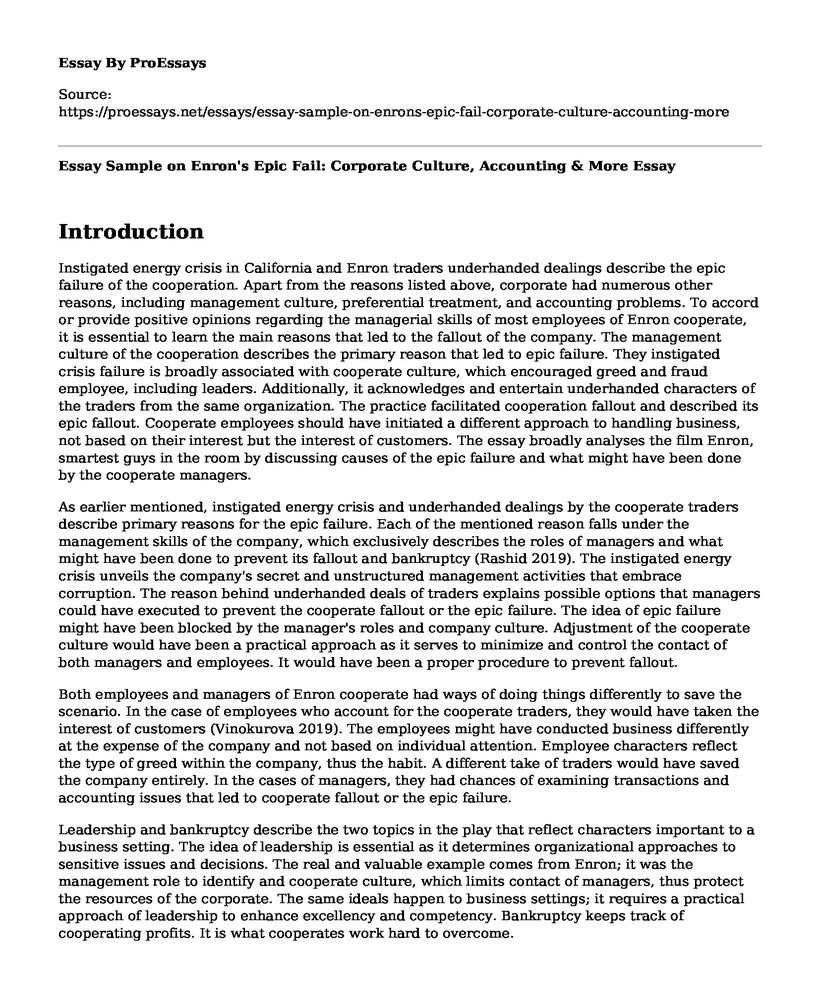Introduction
Instigated energy crisis in California and Enron traders underhanded dealings describe the epic failure of the cooperation. Apart from the reasons listed above, corporate had numerous other reasons, including management culture, preferential treatment, and accounting problems. To accord or provide positive opinions regarding the managerial skills of most employees of Enron cooperate, it is essential to learn the main reasons that led to the fallout of the company. The management culture of the cooperation describes the primary reason that led to epic failure. They instigated crisis failure is broadly associated with cooperate culture, which encouraged greed and fraud employee, including leaders. Additionally, it acknowledges and entertain underhanded characters of the traders from the same organization. The practice facilitated cooperation fallout and described its epic fallout. Cooperate employees should have initiated a different approach to handling business, not based on their interest but the interest of customers. The essay broadly analyses the film Enron, smartest guys in the room by discussing causes of the epic failure and what might have been done by the cooperate managers.
As earlier mentioned, instigated energy crisis and underhanded dealings by the cooperate traders describe primary reasons for the epic failure. Each of the mentioned reason falls under the management skills of the company, which exclusively describes the roles of managers and what might have been done to prevent its fallout and bankruptcy (Rashid 2019). The instigated energy crisis unveils the company's secret and unstructured management activities that embrace corruption. The reason behind underhanded deals of traders explains possible options that managers could have executed to prevent the cooperate fallout or the epic failure. The idea of epic failure might have been blocked by the manager's roles and company culture. Adjustment of the cooperate culture would have been a practical approach as it serves to minimize and control the contact of both managers and employees. It would have been a proper procedure to prevent fallout.
Both employees and managers of Enron cooperate had ways of doing things differently to save the scenario. In the case of employees who account for the cooperate traders, they would have taken the interest of customers (Vinokurova 2019). The employees might have conducted business differently at the expense of the company and not based on individual attention. Employee characters reflect the type of greed within the company, thus the habit. A different take of traders would have saved the company entirely. In the cases of managers, they had chances of examining transactions and accounting issues that led to cooperate fallout or the epic failure.
Leadership and bankruptcy describe the two topics in the play that reflect characters important to a business setting. The idea of leadership is essential as it determines organizational approaches to sensitive issues and decisions. The real and valuable example comes from Enron; it was the management role to identify and cooperate culture, which limits contact of managers, thus protect the resources of the corporate. The same ideals happen to business settings; it requires a practical approach of leadership to enhance excellency and competency. Bankruptcy keeps track of cooperating profits. It is what cooperates work hard to overcome.
Conclusion
To sum up, Enron, the smartest guys in the room, highlights the primary causes of the cooperate epic failure, which is connected to the energy crisis, among other reasons. The cooperate culture embraced ideals of corruption, which describes organization fallout. Managers would have handled management issues differently to prevent the epic failure of Enron.
References
Rashid, M. M. (2020). Case Analysis: Enron, Ethics, Social Responsibility, and Ethical Accounting as Inferior Goods? Retrieved from https://mpra.ub.uni-muenchen.de/98441/
Vinokurova, N. (2019). Risk and Ruin: Enron and the Culture of American Capitalism. By Gavin Benke. Philadelphia, PA: University of Pennsylvania Press, 2018. Pp. 272. $29.92, hardcover. The Journal of Economic History, 79(2), 576-578. Retrieved from https://ideas.repec.org/a/cup/jechis/v79y2019i02p576-578_00.html
Cite this page
Essay Sample on Enron's Epic Fail: Corporate Culture, Accounting & More. (2023, Apr 08). Retrieved from https://proessays.net/essays/essay-sample-on-enrons-epic-fail-corporate-culture-accounting-more
If you are the original author of this essay and no longer wish to have it published on the ProEssays website, please click below to request its removal:
- Nursing Leadership: Reflection Paper Example
- The Importance of Groups to Christian Leadership Essay
- Life-Threatening Situations as an Imminent Danger to an Individual Paper Example
- Essay Sample on Organizational Design
- Jonathan Edwards' Spiritual Leadership - Essay Sample
- Project Management: Comp. UG Sprinkler Sys & Stakeholder Management - Essay Sample
- Essay Example on 21st Century: Knowledge a Common Denominator in Decision Making







